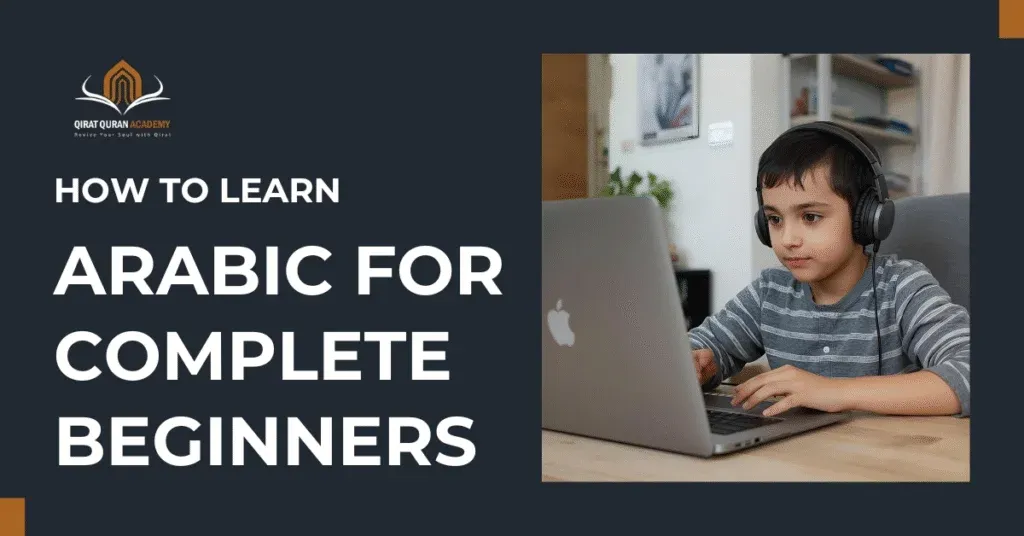Learning a new language may feel like stepping into a warm, stirring market: noise, colorful, and slightly heavy in the first. If your goal is to learn Arabic as a complete beginning, then you are in the right place. This guide gives a clear, realistic roadmap – from the alphabet to confident conversation – you can use today with practical daily stages and real tips.
Why Learn Arabic? (Motivation & Benefits)
Why choose Arabic? Brief Answer: Because it opens the doors. If you want to travel, want to join the family, read the Quran, pursue your career, or enjoy Arabic films and poetry, Arabic gives you access to a huge cultural and economic world. Learning any language also adds to your thinking again – it improves memory, sympathy and meditation. Hence apart from practical benefits, Arabic is a mental gift that keeps on giving.
Practical reasons: travel, work, community
Need to navigate an Arabic speaking city or work with customers in the Middle East? Knowing the basic phrases will make life simple and friendly. Employers attach importance to Arabic speakers in diplomacy, education, media and business.
Spiritual & cultural reasons: Quran, literature, film
If your interest is religious or cultural – such as reading the Quran in Arabic – the awards are deep. Classical texts, poetry and modern films have layers that only reveal the language.
Which Arabic Should You Learn? (MSA, Dialects, Quranic Arabic)
Arabic is not a “spoken” language – it is a family.
Modern Standard Arabic (MSA)
MSA is the formal language used in news, books, and official writing across the Arab world. If you want to read newspapers or academic texts, start here.
Colloquial dialects (Egyptian, Levantine, Gulf, Maghrebi)
For daily conversation, the dialect matters. Egypt and Levantin are widely understood (thanks to film and music). If you live in Morocco or Algeria, Magrebi dialect is very different. Quickly decide which bid fits your goals.
Quranic / Classical Arabic
Quranic Arabic has its own vocabulary and grammar characteristics. If your purpose is to understand the Quran, then the MSA study combined with a focused Quran text (Tajweed and Vocabulary).
Setting Smart Goals: What “learn Arabic” means for you
“What does Arabic learning mean?” You are the most important question before the study.
Short-term vs long-term goals
Short-term: “I want to read the Arabic alphabet and introduce myself.” Long-term: “I want to hold a 30-minute conversation” or “read the Quran with understanding.” Break big goals into small, measurable steps.
Skills: speaking, reading, listening, writing
Decide which skill is the priority. For most beginners, reading (alphabet) + speaking (basic phrases) + listening practice gives the fastest satisfaction.
The Core Roadmap: Step-by-step for beginners

Here’s a practical path that’s simple to follow.
Step 1 — Learn the Arabic alphabet & pronunciation
Start with the 28 letters and common sounds. Arabic script connects letters, so practice writing. Focus on sounds that don’t exist in English — like ḥā (ح), ʿayn (ع), and qāf (ق). Pronunciation early prevents fossilized mistakes later.
Step 2 — Build core vocabulary (survival words first)
Learn 300–500 high-frequency words: greetings, numbers, days, family, food, and question words. Use flashcards or SRS (spaced repetition system) tools.
Step 3 — Basic grammar (phrases, verbs, sentence structure)
Start with present tense verbs, subject-verb-object word order (simple sentences), and common prepositions. Keep grammar bite-sized — focus on communication, not perfection.
Step 4 — Reading simple texts & Quranic verses (if relevant)
Short children’s stories, graded readers, and simple Quranic verses (with translation) are excellent. Read aloud to connect letters to sound.
Step 5 — Speaking and listening practice
Listen to simple podcasts, children’s shows, or recitation. Speak daily — to a tutor, language partner, or even to yourself. Shadow native speakers to improve rhythm.
Daily & Weekly Study Plan (30/60/90 day blueprint)
You don’t need hours a day — consistency beats intensity.
What a 20–30 minute daily routine looks like
- 5–7 min: Alphabet / pronunciation drills (if early stage)
- 8–10 min: Vocabulary with SRS flashcards
- 5–8 min: Listening practice (short clips or recitation)
- 5 min: Speaking aloud or repeating phrases
Weekly goals and progress checks
Set a weekly goal (learn 50 words, read 2 short pages, complete 3 tutor sessions). Review at week’s end: what stuck? What needs more work?
Methods & Tools That Actually Work
Mix methods — each reinforces the other.
Apps, textbooks, and online courses
Use apps for vocabulary and spaced repetition. Pick one structured course (online or book-based) for grammar: something that offers clear lessons and exercises.
Tutors, language partners, and immersion
A tutor accelerates progress. If you prefer self-study, find a language exchange partner to practice speaking.
Using media: songs, podcasts, TV, and Quran recitation
Passive listening boosts comprehension. For Quran learners, regular listening to qaris (reciters) helps train your ear and improves pronunciation.
Practical Tips to Speed Progress
Small habits make big differences.
Spaced repetition, shadowing, and mnemonics
SRS ensures long-term retention. Shadowing (repeat after native speech) improves pronunciation and fluency. Use mnemonics to remember tricky words.
Speak from day one — even if you make mistakes
Mistakes are proof you’re trying. Speaking early builds confidence.
Quick speaking drills to try
- Describe your day in one sentence.
- Count objects around you in Arabic.
- Repeat a 30-second audio clip until you can recite it cleanly.
Common Mistakes Beginners Make (and how to avoid them)
- Trying to learn everything at once. Fix: focus on one skill at a time.
- Ignoring pronunciation. Fix: prioritize sounds early.
- Relying solely on apps. Fix: add speaking and real interaction.
- Forgetting reviews. Fix: schedule weekly reviews with SRS.
Special Advice for Quran Learners (on qiratquran.com)
If you’re on qiratquran.com to learn Arabic for Quranic purposes, lean into targeted practice.
Difference between Arabic for conversation and Quranic Arabic
Quranic Arabic uses older grammar and unique vocabulary. You can learn both: MSA for communication, and separate Quranic lessons for script and tafsir (meaning).
Tajweed, pronunciation, and reading practice
Tajweed rules are crucial for correct recitation. Practice with a qualified teacher, listen to experienced qaris, and repeat small passages until your articulation matches.
(If you’d like structured Quranic lessons and tajweed practice, qiratquran.com likely offers tailored programs — check the course pages or contact their tutors for a personalized plan.)
How to Measure Progress & Stay Motivated
Track small wins to keep going. Measures of progress:
- Number of words you recall without help.
- Minutes of uninterrupted listening comprehension.
- Ability to read a new paragraph aloud accurately.
- Number of 5–10 minute conversations you can hold.
Celebrate every milestone — learn 50 words? Treat yourself. Kept 30 days of practice? Big win.
Frequently Asked Questions (FAQs)
A: It depends on your goals and investment of time. With 20–30 minutes daily, many learners reach basic interaction and reading skills in 3–6 months. The flow takes more time – often years – but you will be surprised how soon they add small, daily steps.
A: If your goal is reading, media or formal education, then start with MSA. If you want to communicate quickly with the people of a specific country, start with the dialect of that country (eg, Egypt or Leventine). You can learn both: MSA Plus bid you need.
A: Yes – But the speed of a tutor progresses, corrects pronunciation, and keeps you accountable. Self-teachers should combine apps, graded readers, media and language-access partners to fill the gaps.
A: Pay attention to hearing and cinematography. Daily practice of specific sounds (eg ḥā, ʿayn, qāf), repeat after indigenous speakers, and record yourself. A tutor or native partner can respond immediately.
A: Surely – but note that Quranic Arabic contains specific terminology and grammar. Dedicated Quran text and pair MSA studies with Tajweed exercises (you can find the target courses on Qiratquran.com to help).
Conclusion
Learning Arabic as a complete beginner is absolutely doable — with the right plan, consistent practice, and realistic goals. Start with the alphabet, build a foundation of 300–500 words, pair grammar with speaking practice, and use SRS and shadowing to lock in habits. Whether your aim is conversational Arabic, reading the Quran, or both, a steady, joyful routine will get you there. Want structure? Try a 30-day plan, find a tutor, and use qiratquran for focused Quran learning and tajweed practice.




